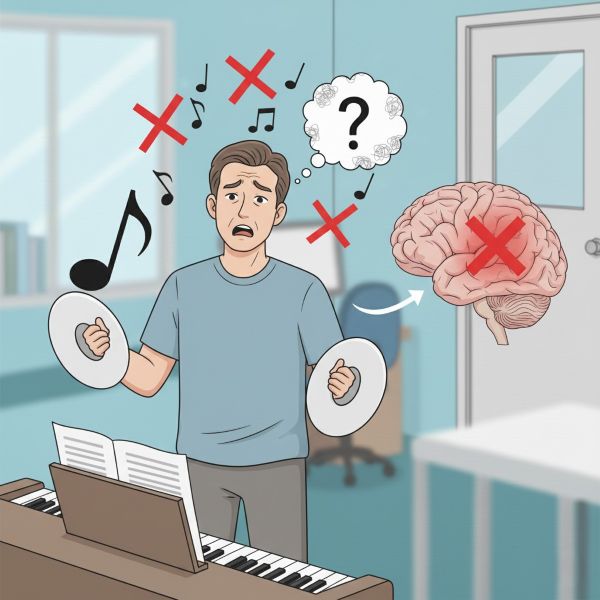Amusia
Definition and Subtypes
Amusia is the inability to recognize, appreciate, or reproduce music. It is an agnosia for music that occurs despite normal intelligence, memory, and language function. A premorbid appreciation of music is necessary for a diagnosis of acquired receptive amusia, and as such, most reported cases have been in trained musicians.
Several subtypes of amusia have been described:
- Receptive (Sensory) Amusia: The loss of the ability to appreciate or recognize music. This can involve a specific impairment in pitch processing, while the awareness of musical rhythm remains preserved.
- Expressive (Motor) Amusia: The loss of the ability to produce music, such as by singing, whistling, or playing an instrument. This form is thought to be relatively common, affecting up to 4% of the population.

Amusia, or "tone deafness," is the inability to perceive or produce musical tones or rhythm, a specific type of auditory agnosia.
Pathophysiology and Clinical Associations
Amusia may occur in the context of more widespread cognitive dysfunction, such as aphasia or a global auditory agnosia (where it can be associated with pure word deafness).
Isolated amusia has been reported in cases of focal cerebral atrophy affecting the non-dominant (usually right) temporal lobe. However, functional imaging studies suggest that music perception relies on a distributed, cross-hemispheric neural network rather than being localized to a single hemisphere. This complex network is responsible for processing different components of music, such as pitch, rhythm, and timbre.
References
Confavreux C, Croisile B, Garassus P, Aimard G, Trillet M. Progressive amusia and aprosody. Archives of Neurology 1992; 49: 971-976
Hyde KL, Peretz I. Brains that are out of tune but in time. Psychological Science 2004; 15: 356-360
Schuppert M, Münte TF, Wieringa BM, Altenmüller E. Receptive amusia: evidence for cross-hemispheric neural networks underlying music processing strategies. Brain 2000; 123: 546-559
Wertheim N. The amusias. In: Vinken PJ, Bruyn GW (eds.). Handbook of clinical neurology, Vol. 4: Disorders of speech, perception, and symbolic behaviour. Amsterdam: North-Holland Publishing, 1969: 195-206
Cross References
Agnosia; Auditory agnosia; Pure word deafness
